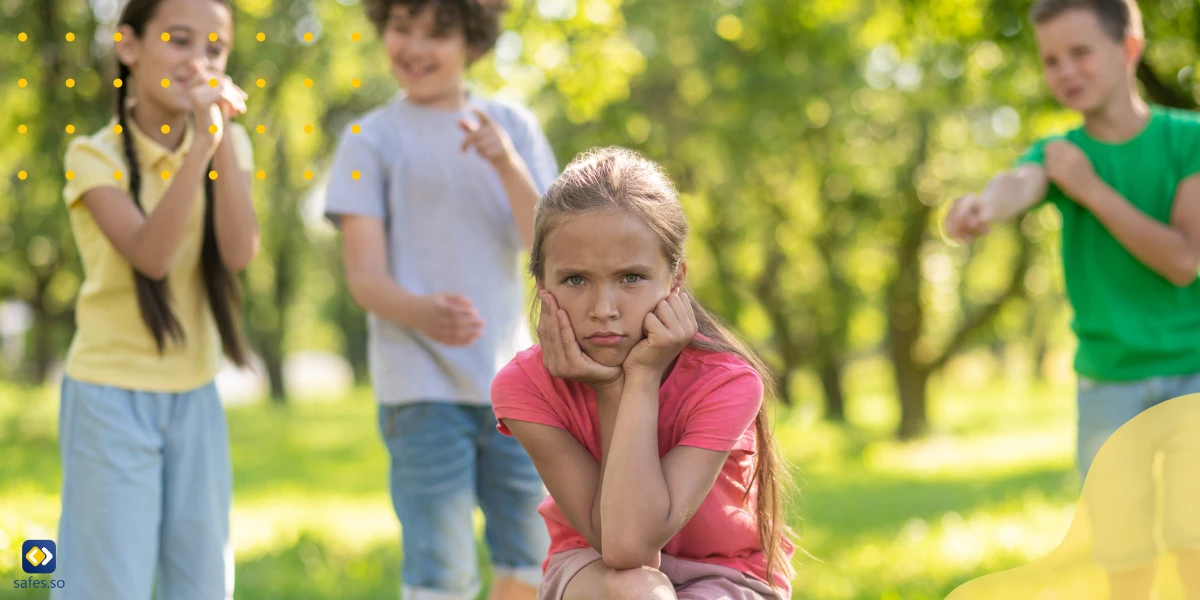Parents that are overly concerned with their children’s safety and security to shield them from suffering on any level—physical, mental, or emotional—are said to be overprotective. They make an effort to manage their kids’ behavior and upbringing, take away any barriers, and soften the shocks of daily life. They act in this way out of love and concern, but by going beyond the actual risk limits and interfering with their development, they may end up doing long-term damage to their children. In this blog, we’ll go more into the negative effects of overprotective parenting on social skills, examples of overprotective parenting behaviors, and how to avoid overprotective parenting.
Download and Start Your Free Trial of the Safes Parental Control App
Signs of Overprotective Parents
Now that it’s clear what overprotective parents are, let’s look at some of the signs that indicate whether you are an overprotective parent.
- Controlling your child’s choices
- Overreacting to failures
- Fear of injury to the child
- An excessive focus on the child’s performance
- Strict rules
Other indications of overprotective parenting include denying the child freedom and maintaining strict control over them, turning the child into a dependent individual by taking care of everything for them, and constantly worrying that something bad will happen to the child and projecting these worries onto them.

Effects of Overprotective Parenting
To get more awareness of the harms of overprotective parenting, let’s see how parents affect their children’s lives by being overprotective. We have distinguished the effects on psychological and social skills.
Negative Effects of Overprotective Parenting on Social Skills
Are you wondering whether overprotective parents can cause social anxiety? Let’s look at some of the negative effects of overprotective parents on a child’s social skills:
- Difficulty making friends
- Lack of social confidence
- Inability to problem-solve and make decisions independently
- Limited exposure to different social situations
- Development of social anxiety and fear of new experiences
The Psychological Effects of Strict and Overprotective Parents
Parental overprotection can have a variety of effects on kids as they grow up. A child’s self-esteem and temperament may suffer if they are under excessive pressure to succeed all the time. Due to all of this, children may experience mental health problems like depression, anxiety, codependency, disordered eating, and substance abuse.
According to studies, overprotective parenting can result in a child’s sensitivity to danger, dependence on the parents, increased risk of psychological problems, a lack of effective coping skills, and persistent anxiety.

Examples of Overprotective Parenting Behaviors
Some examples of overprotective parents are helicopter, lawnmower, and tiger parents. Let’s dive deeper into each one of them.
Helicopter Parenting
Parents who are involved in every aspect of their children’s lives, sometimes to the disadvantage of the children, are referred to as “helicopter parenting”, which is an overprotective and very involved parenting style. The idea that these parents “hover” over their children and then save them when necessary is where the name “helicopter parenting” comes from.
Negative consequences of helicopter parenting include lack of independence, low self-esteem, anxiety, sadness, and poor decision-making abilities in kids.
Lawnmower Parenting
A variation of helicopter parenting is known as “lawnmower parenting”. Parents go above and beyond to make life as simple as possible for their kids. They emphasize protecting their child from any suffering or difficulty by removing barriers before their children can encounter them. They continue on their path, micromanaging, intervening, and organizing. Their objective is to shield them from adversity, discomfort, failure, and disappointment.
Parenting with a lawnmower can be harmful to both parents and kids. Giving children inflated egos, underdeveloped emotional skills, reduced problem-solving abilities, undeveloped self-esteem, increased anxiety, low distress tolerance, helplessness, and physical and mental health problems like depression and anxiety are some detrimental outcomes.
Tiger Parenting
Tiger parenting is a parenting style that emphasizes excellent academic performance and excellence in high-status extracurricular activities like music or athletics. Tiger parents put a lot of pressure on their kids to perform well in school. These parents micromanage their kids’ life to make sure they live up to their high standards.
Tiger parenting can have detrimental effects, including high levels of pressure to succeed, an increase in anxiety and depression, poor social skills, poor cognitive and emotional development, and limitations to children’s creativity and growth.
How to Avoid Overprotective Parenting
Have you concluded that you’re an overprotective parent based on the above-mentioned signs and are you worried about your child’s development? We’re here to help you avoid overprotective parenting and learn how to parent healthily with the following recommendations:
- Encourage independence and decision-making in your child
- Gradually increase exposure to new social situations
- Foster healthy risk-taking
- Teach problem-solving skills
- Seek help when necessary
If you’re worried and overprotective to protect your kids from social media, you can use parental controls like Safes. Safes offers plenty of features to monitor your children from afar, including safe search, live location, instant block, and app rules. To download the app on iOS or Android, click on the respective link. Start your Safes free trial today on iOS or Android—no credit card required. For more information, you can read the following resources by clicking on the relevant links:
- Windows parental controls
- Macbook parental controls
- Parental controls on Android
- iPhone parental controls
Conclusion
Parents want to protect their children from any harm that may come their way. However, when this protective instinct is taken to the extreme, it can have negative consequences on their children’s development. Overprotective parents tend to shield their kids from any risks or challenges, which might hinder the development of social skills necessary for success in the long run. Although overprotective parenting can seem like a safeguard against harm, parents need to be mindful of their parenting style’s long-term implications on social skills.
In conclusion, overprotective parenting can have negative outcomes on children’s social skills, limiting their ability to interact with others and navigate life’s social complexities. Parents need to be mindful of their parenting style and promote independence, autonomy, and social interactions for optimal social skill development.
Your Child’s Online Safety Starts Here
Every parent today needs a solution to manage screen time and keep their child safe online.
Without the right tools, digital risks and excessive screen time can impact children's well-being. Safes helps parents set healthy boundaries, monitor activity, and protect kids from online dangers—all with an easy-to-use app.
Take control of your child’s digital world. Learn more about Safes or download the app to start your free trial today!




